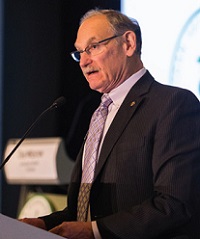 |
| AVMA President Ted Cohn |
One major news organization suggesting improper actions by members of your profession is bad enough; two is downright painful--and possibly unjustified. That's the message from Ted Cohn, president of the American Veterinary Medical Association, who has officially denounced what he calls a series of "attack" articles on veterinarians that allege their relationships with drug companies are unethical.
The problems started in December, when the Indianapolis Star and Reuters each published investigative stories raising questions about whether there are conflicts of interest in the veterinary world that endanger animal health.
A three-part story in the Star focused on Eli Lilly's ($LLY) Trifexis, an oral flea-and-tick fighter that several dog owners have blamed for causing the death of their pets. The stories voiced concerns about whether the FDA's approval process for veterinary drugs is rigorous enough, and blasted veterinarians for accepting gifts from drug companies at medical conferences or payments from them for speaking engagements--the implication being that such gratuities might encourage them to prescribe certain drugs over others.
Cohn wrote a letter to the Star defending the ethics of his profession. "While you tried to paint a picture of veterinarians being beholden to pharmaceutical companies for monetary gain, you failed to cite even one specific case of impropriety or lack of professionalism," wrote Cohn, who is himself a practicing vet. "Like every business, veterinarians must make a profit to stay in business, but to suggest that a profit motive would compromise our professional judgment without any supporting evidence is simply irresponsible."
The Reuters story examined the role of veterinarians in the food-animal industry. As of this year, veterinarians have sole power to decide when farm animals should receive antibiotics--a new FDA rule meant to alleviate concerns about antibiotic resistance. But the Reuters reporters discovered that 11 out of the 22 veterinarians who have advised the FDA on antibiotics policies received payments from pharmaceutical companies, which they did not have to disclose because laws governing transparency in pharma don't apply to veterinarians.
"Veterinarians work tirelessly to earn the trust and respect of food animal producers, government agencies, educators, industry and the public," Cohn wrote in response to the Reuters story. "There is no evidence to suggest that a veterinarian's prime motivation is anything other than to do what is in the best interest of their patients and clients."
The AVMA says in a press release that it supports full disclosure of anything that might be construed as a conflict of interest and "would be happy to work with federal officials in drafting legislation that would increase transparency."
- here's the AVMA's release